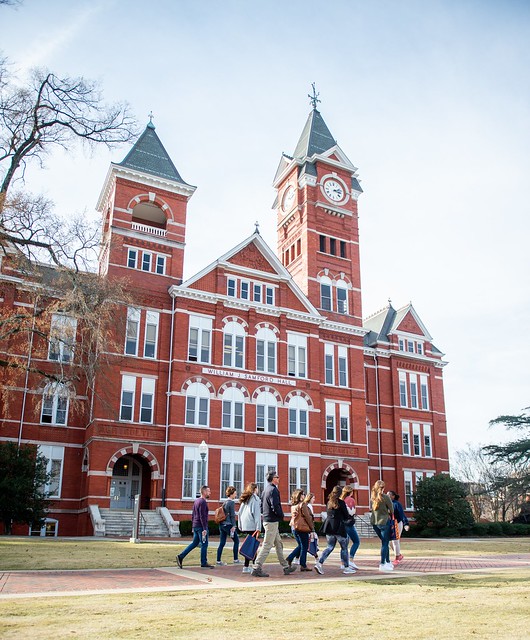Auburn Family supports diversity, inclusion, access on Tiger Giving Day
Article body
Among the takeaways from last month’s historic Tiger Giving Day was the Auburn Family’s support for 11 projects that have a direct diversity, inclusion and access focus.
“I was impressed by the variety of projects this year that will have a meaningful impact on both the Auburn Family and our surrounding communities,” said Taffye Benson Clayton, associate provost and vice president for inclusion and diversity. “Many units across our campus have been inspired by the opportunity that Tiger Giving Day offers to further demonstrate the importance of diversity and inclusion. The inspiration is evident, as nearly one-fifth of Tiger Giving Day projects were focused on creating a more diverse, equitable and inclusive campus.”
All totaled, Auburn’s seventh Tiger Giving Day raised funds from more than 5,000 donors for a record-breaking 51 projects.
The diversity focused projects included an initiative to fund the Together We Will Scholarship sponsored by Clayton, Auburn Athletics and Bruce Pearl, head coach of Auburn’s men’s basketball team. With broad support from donors throughout the Auburn Family, Together We Will raised 444% of its goal. The scholarship will be used to support Auburn’s efforts to achieve a robust and diverse enrollment of students while enhancing access, affordability and academic quality.
Additionally, Auburn’s College of Human Sciences led a successful effort to increase diversity in hospitality management by establishing a workshop that invites underrepresented groups to study hospitality and tourism at Auburn.
Donors also gave more than $16,000 to support the National Association of Black Accountants chapter in the Harbert College of Business. The Auburn Family’s support will help Auburn’s NABA chapter recruit, retain and invest in student business leaders now and in the future by offsetting conference expenses, supporting the creation and production of promotional and recruitment materials, fostering community-building and professional development opportunities and more.
A unique project from the College of Architecture, Design and Construction raised more than $10,000 to document and digitally preserve the historic Rosenwald Schools. Built between 1912 and 1932, these schools increased educational opportunities for African American children in the South.
Five projects focused on outreach, with goals to prepare students and provide services in underrepresented areas throughout the state.
“I was particularly impressed by the number of projects that involved working with younger students from under-resourced schools in Alabama,” Clayton said. “Inspiring students at an early age and addressing opportunity gaps that our university is uniquely positioned to address extends and reinforces our engagement and impact more broadly.”
The College of Education’s Learners Exploring Academic Dreams, or LEAD, Camp project through the Truman Pierce Institute offered donors an opportunity to support 30 students from Loachapoka High School. Raising more than $20,000 on Tiger Giving Day, the LEAD Camp project was spearheaded by three former participants from Loachapoka High School who are now Auburn students or graduates.
“Tiger Giving Day is my favorite initiative on campus,” said Will Brown, special projects coordinator with Auburn’s Truman Pierce Institute and a former LEAD Camp participant. “It gave me such joy to see the Auburn Family fully support our cause. This program is key to Auburn’s goal to increase diversity and inclusion as LEAD promotes and champions the enrollment of minority students.”
Auburn’s Black Alumni Council sponsored a project to support the Dr. Harold A. Franklin Memorial Endowed Scholarship. Named in honor of the first Black student to enroll at Auburn, this scholarship will help underrepresented students attend Auburn.
“The scholarship project was an excellent opportunity to remember the courage, sacrifice, bravery and legacy of the extraordinary Dr. Harold A. Franklin. He paved the way for me and over 10,000 Black Auburn alumni while positively impacting students in a meaningful, long-lasting way,” said Chacolby Burns-Johnson, chair of Auburn’s Black Alumni Council. “The response from more than 350 Auburn family and friends near and far shows the importance of this scholarship. Not only did we reach our $25,000 Tiger Giving Day goal, but we exceeded it by over $6,000. For that, we are grateful and say thank you to all the donors. I look forward to seeing the Dr. Harold A. Franklin Memorial Scholarship Endowment serve more students and grow even more in the years to come.”
A new program, Experience Auburn, offsets the cost for students who could not otherwise afford a visit to campus. The Auburn Family gave nearly $30,000 to open the door of access to underrepresented students and provide an early glimpse of the Auburn experience as they make their college selections.
“This kind of support shows just how much the Auburn Family wants to help our students and underpins our commitment to diversity, access and inclusion,” said Joffery Gaymon, Auburn’s vice president for enrollment. “We know that visiting campus is a key part of the college selection process, but for some, cost can be a prohibitive factor. Thanks to the support and commitment of the Auburn Family, Experience Auburn will make the visit experience a possibility.”
Related Media
Media interested in this story can contact Communications Director Preston Sparks at (334) 844-9999 or preston.sparks@auburn.edu.
Auburn University is a nationally ranked land grant institution recognized for its commitment to world-class scholarship, interdisciplinary research with an elite, top-tier Carnegie R1 classification, life-changing outreach with Carnegie’s Community Engagement designation and an undergraduate education experience second to none. Auburn is home to more than 30,000 students, and its faculty and research partners collaborate to develop and deliver meaningful scholarship, science and technology-based advancements that meet pressing regional, national and global needs. Auburn’s commitment to active student engagement, professional success and public/private partnership drives a growing reputation for outreach and extension that delivers broad economic, health and societal impact.







